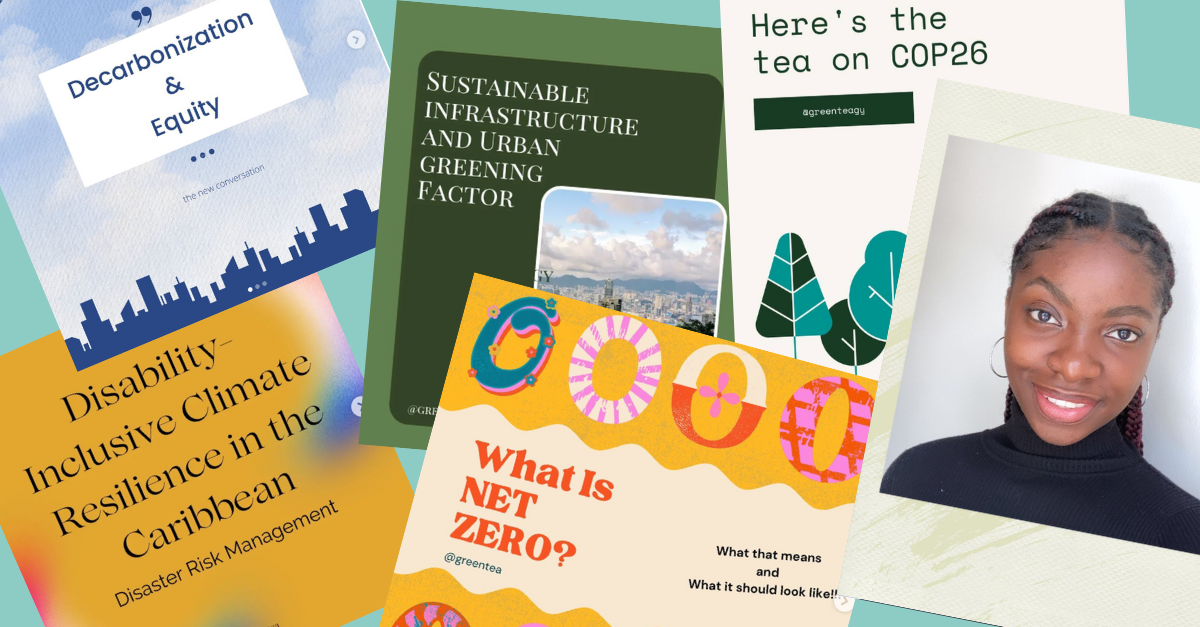
Gen Z wants to spill the (green) tea: A conversation with Instagram Climate Activist Moriah Hamilton
An unwavering voice asks a question from the back of the room. The Equity Panel at the ACEEE Summer Study on Energy Efficiency in Buildings is packed, but the voice, strong and confident, carries easily to the front. "How are you really centering communities? You're talking to governments. But what about the people?"
My ears perk up. It’s the question I wish we’d all answer first.
I catch a glimpse of the question-asker to make a mental note to find them later — a difficult task in a sea of a thousand people in masks.
My search didn’t take long. "@Green_Tea_Gy tagged Slipstream in an Instagram story," my phone notifies me. I see the question-asker speaking about Slipstream senior researcher Dan Streit's Summer Study talk, "Energy Efficiency is (only) part of the solution," which called on our industry to make energy efficiency a layer in programs that support existing community priorities.
I scroll through her page. Posts on disability-inclusive climate resilience, urban agriculture, sustainable buildings — all written with levity and in a way that’s easily digestible. No negativity or intimidation. The page speaks truth to power.
Equipped with a better visual, I find @Green_Tea_Gy at the beach that evening and introduce myself. Her name is Moriah Hamilton, a junior at Howard University from Guyana at Summer Study on the Linda Latham scholarship, who is deeply passionate — and knowledgeable — about making the built environment more sustainable. And most importantly: she knows that unless we do right by the people in the buildings, none of it matters.
Moriah joined me for a conversation while she was back home in Guyana over the semester break. We talked about sustainability in the built environment, what she wishes our industry would do more to center, and how to bring Gen Z into the conversation.
Without further ado, Meet Moriah.
Since we last talked at the beginning of her junior semester, I wanted to know more about what she was up to now — and where she came from. Moriah told me about her education at Queens College, at Howard University, and in her work at a project management firm.
As a former professor, I appreciate Moriah's reminder that education lets you see how things change in real time — a powerful way to describe the value of learning. Next we dig into Summer Study. I want to know what she was excited about, and what she wanted more of.
Oh, now we're talking! "If there's not a strong enough connection to the communities, then those solutions will be useless," indeed. These are the same concerns that I have — that our research often gets in the way of meeting the needs of people because we worry so much about finding the perfect solution that we don't stop to listen and learn whether that’s even the solution they need.
Where else does she see our industry disconnect from people, I wonder?
This relay race metaphor strikes me. Not only is the baton passed incorrectly, but it begins in the wrong place. And if it doesn't begin from the community, how are we supposed to help people see themselves in the solutions?
People on the frontlines of climate and racial injustice are "left with an aftertaste of colonialism and redlining," Moriah implores. Humility, and a little listening will get us far. I wonder: what does a future in which we've listened to community hopes and used our resources to help them actualize their goals look like in Moriah's eyes?
Diverse, equitable, clean, and not rooted in consumerism — that's a clean energy future I can get behind for sure. I wonder what advice she has for the building industry about how we get there.
"Sustainability can look differently from fancy glass and bamboo toothbrushes," Moriah reminds us. Heck yes! The most sustainable future of all is one that centers function over aesthetic.
Thinking about payoff is a good way to figure out what we should focus on. In Moriah's eyes, collaboration has a high payoff for making meaningful change.
What made this sustainability-minded engineering student turn to advocacy on Instagram? We focus a lot on the tech know-how for the solutions. Why social media?
What I love about this story is that Moriah was driven to educate her peers in Guyana about sustainability to empower them to take action on climate change. I'm curious to know what advice she’d offer other young people burdened by climate anxiety.
Alright, I have to ask the most burning question I’ve got. From Moriah’s mouth to your ears, here's what she wishes that older generations would understand about Gen Z, social media, and the listening we need to do to make change.
"We believe in quantifiable action and change, and really driving change in areas it has been lacking in for so many years." Moriah speaks truth to power about Gen Z. Young people want to learn what they don’t know and drive change where they can. As we close our conversation, I’m left reflecting on what our industry can do to drive that education.
I can't help but think that Moriah Hamilton's nom de 'gram @Green_Tea_Gy should become a role model for all of us. It’s time to spill the building-science tea to Gen Z and join them as they march with us toward a truly equitable, clean energy future.